See the Original Manuscript of Kafka's 'The Metamorphosis' at The Morgan Library
Join a guided tour of a special exhibit on Franz Kafka featuring artifacts never displayed in the US!


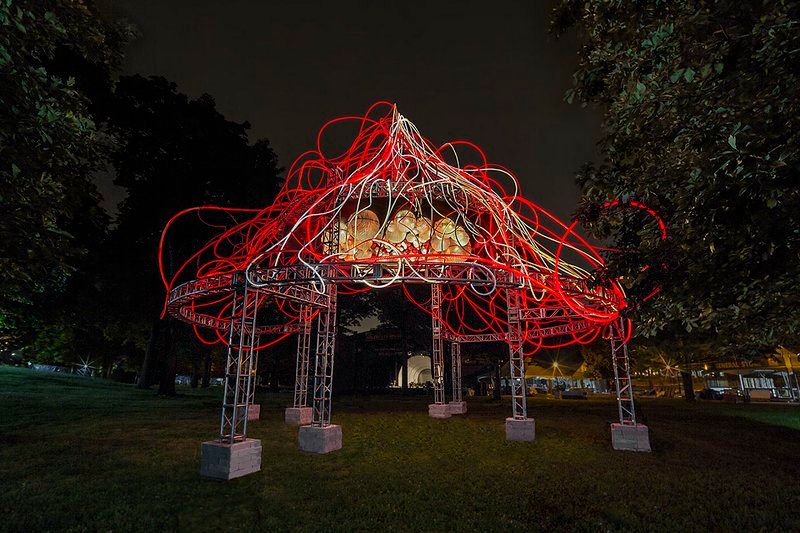
Photo courtesy of Grimanesa Amoros Studio
It might be the last moth of summer already, but August has the largest variety of outdoor art installations yet this year (in our opinion), with many pushing the boundaries of public art, as the artists experiment with different mediums and new levels of viewer engagement. Rather than letting the viewer stand back and observe, many of these installations fulfill their purpose and demonstrate the artist’s vision not when viewers examine the piece, but engage directly with it, oftentimes through physical occupation and communal use of the artworks. Several installations utilize unique mediums like sound, household objects, lighting, and nature itself.
Read on to see our picks of this month’s must-see installations created by a diverse array of artists across the five boroughs of New York City.

Manhattan Color Walk; Photo by Color Factory courtesy of Cooper Hewitt
Color Factory, an interactive exhibit highlighting the colors of New York, is coming to the Hudson Square neighborhood of SoHo on August 20th and will cover a whopping 20,000 square feet. In August 2017, Color Factory debuted in San Francisco to celebrate color and creativity. Now, it is here in New York, featuring a brand new color palette curated from the streets of the city in a series of site-specific installations that it hopes will connect New Yorkers to the “colorful moments” around the city and in their own daily lives.
Color Factory kicked off with the Manhattan Color Walk at the Cooper Hewitt Museum. The installation ended in July, but it set the stage for the rest of the Color Factory installations coming this month. The Manhattan Color Walk consisted of a path in the Cooper Hewitt Garden, painted with numerous stripes that correspond to specific moments encountered by Color Factory artists as they explored 265 streets in Manhattan, walking over 50 miles and selecting colors that prompt viewers to consider the role of color in defining a unique location.
Tickets are available here if you want to snag one before they’re sold out!

Photo courtesy of Grimanesa Amoros Studio
Grimanesa Amoros has installed a monumental light sculpture titled HEDERA, which is on view until August 11, 2018 in the Prospect Park Bandshell. Commissioned by BRIC as part of the Celebrate Brooklyn! Festival, the sculpture is 40 feet tall and consists of steel, numerous lighting systems, and red and white tubing systems to illuminate and amplify its surroundings.
Viewers walk into the center of the installation, where they can look up to see their own reflection alongside domes that, combined with the human reflection in the center, signify a blooming flower. This visual phenomenon reflects the artist’s philosophy of using the art piece to forge a relationship between community and public space.
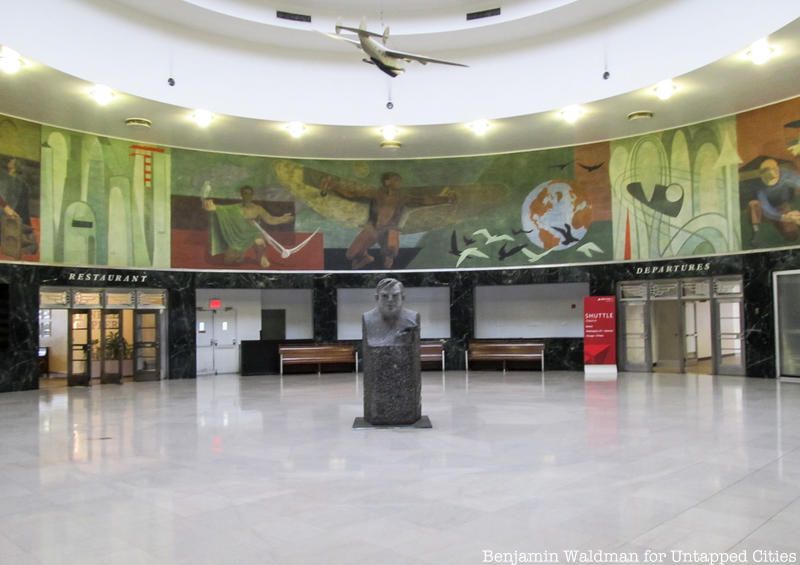
While this installation is not necessarily outdoors, it still made the list because it is in an airport, which is not exactly the most conventional place for public art, and is far outside the realm of museums and galleries. Sandra Lopez-Monsalve, multimedia producer and sound artist, has begun work on her latest project, Sounds of LaGuardia. The piece is referred to as a “sonic exploration of LaGuardia Airport“, in which Lopez-Monsalve records the sounds of travelers moving through the airport in conjunction with another spoken component detailing the histories of the airport. Rather than creating a visual display for people to observe, Lopez-Monsalve seeks to directly engage with travelers; the art piece is both the act of story gathering and the resulting sound compilations that are uploaded to the project’s website.
Voices of LaGuardia Week 1
There are three components to the project: Voices of LaGuardia, which asks travelers a reflection question regarding travel; the Sonomap, in which ambient noises of the airport are recorded and uploaded to a digital map where listeners can choose from the various locations; and Stories of LaGuardia, which features radio-style stories about the history and visual aspects of the airport.
Lopez-Monsalve will be working in various locations around the airport until September 30. The website’s calendar is consistently updated with the times and dates of the artist’s open studios.
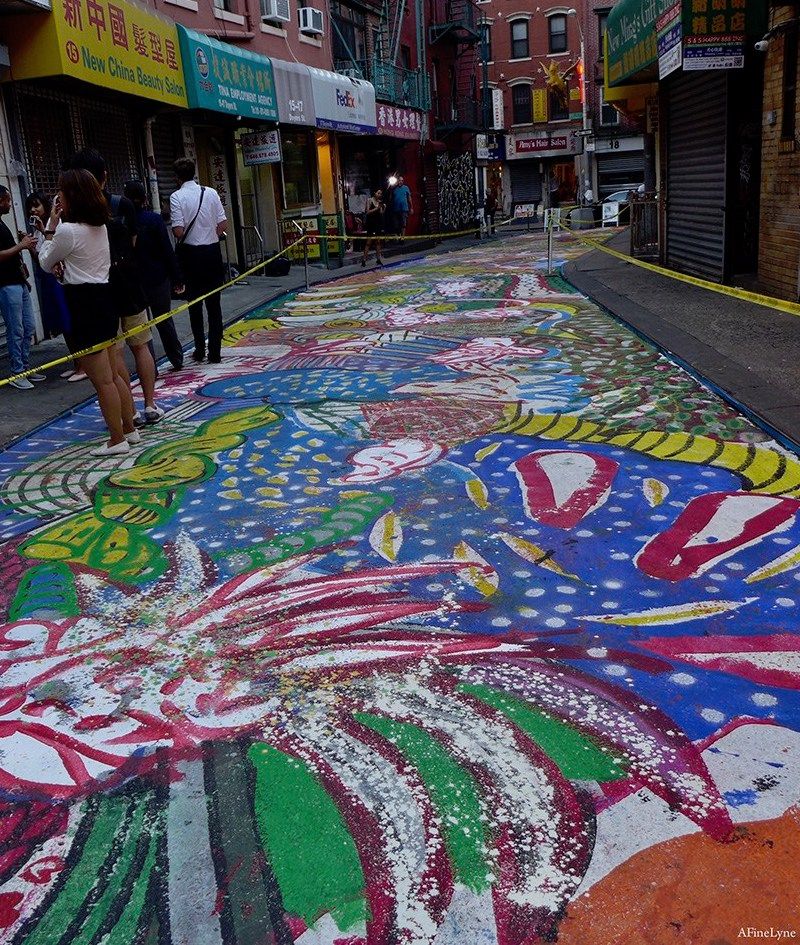
Photo courtesy of AFineLyne
Beginning August 1 and running through November 2018, Chinatown‘s Doyers Street will be blocked off from traffic between the hours of 10 am to 9 pm to create a pedestrian plaza. The highlight of the project will be an art piece titled The Song of Dragons and Flowers, artist Chen Dongfan’s almost 5,000 square-foot street painting that covers the street.
Dongfan was inspired by the history of Chinatown, which he describes as simultaneously being “full of hardship, but also full of love.” He evokes the immigrant experience, from cultural exchange to forging a place to call home, and utilizes the visual symbol of the dragon to represent the Chinese history that has shaped the neighborhood, tumultuously in some cases, and continues to endure to this day.

Founded by artist Mary Mattingly in 2016, Swale is a floating food forest that has travelled to various locations in New York; it debuted this spring at Brooklyn Army Terminal and was originally only supposed to be up until July 1st, but has been etended until August 26, 2018. Swale is an installation built on an enormous barge that provides 5,000 square feet of surface area for an edible perennial garden. Swale aims to educate New Yorkers about the importance of fresh, healthy food and empower them to aim for “ecological resilience through promoting food as a public commons” in their own communities.
Swale debuted at Concrete Plant Park in the South Bronx, which has gained a reputation as a major food desert, and has also docked on Governor’s Island. Almost three million New Yorkers live in communities with poor access to fresh produce; Swale’s goal is to facilitate the growth of fresh food on public land in New York City in order to combat this issue.
In May and June, Untapped Cities Insiders were treated to a tour of Swale with founder Mary Mattingly. Join the Insiders for more free access to unique events like this!
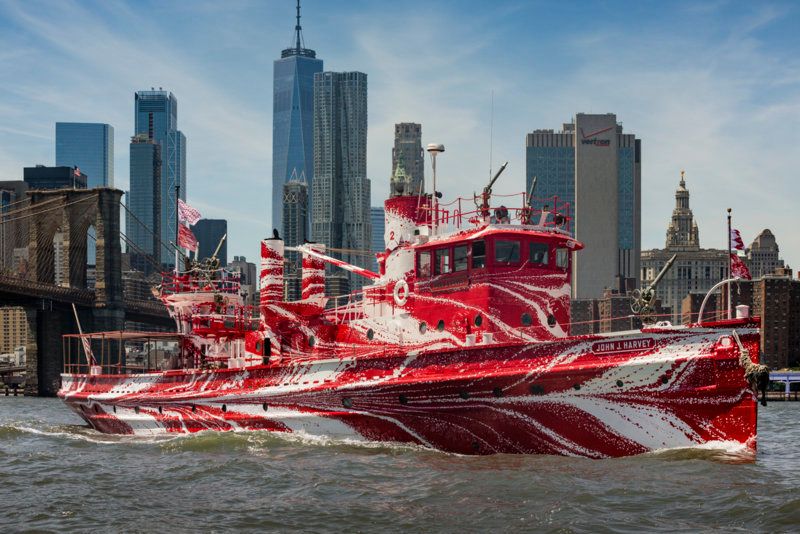 Photo by Nicholas Knight courtesy of Public Art Fund
Photo by Nicholas Knight courtesy of Public Art Fund
Flow Separation by New York artist Tauba Auerbach is a piece that converts the historic Fireboat John J. Harvey into what the Public Art Fund calls a “contemporary dazzle ship.” The concept of the “dazzle ship” dates back to World War I, when British painter Norman Wilkinson came up with the idea to strategically paint war ships in a way that created optical illusions that distorted the forms of the boats. Thus, they puzzled the soldiers on enemy ships who struggled to track the movements of the British ships.
2018 marks the anniversary of the end of World War I, and Auerbach’s installation prompts us to reflect upon this history. The piece evokes themes of innovation and abstraction, for Auerbach was inspired by the forms of objects as they move through water. She employed the method of transferring ink on water onto paper to achieve the pattern on the display boat.
Flow Separation will be on view through May 12, 2019. The initial set of free boat trips sold out quickly but the Public Art Fund is now releasing tickets on upcoming Tuesdays for various dates through October tickets can be purchased on the Public Art Fund website. You can also keep an eye on the fireboat’s calendar to see when registration for future rides open up.
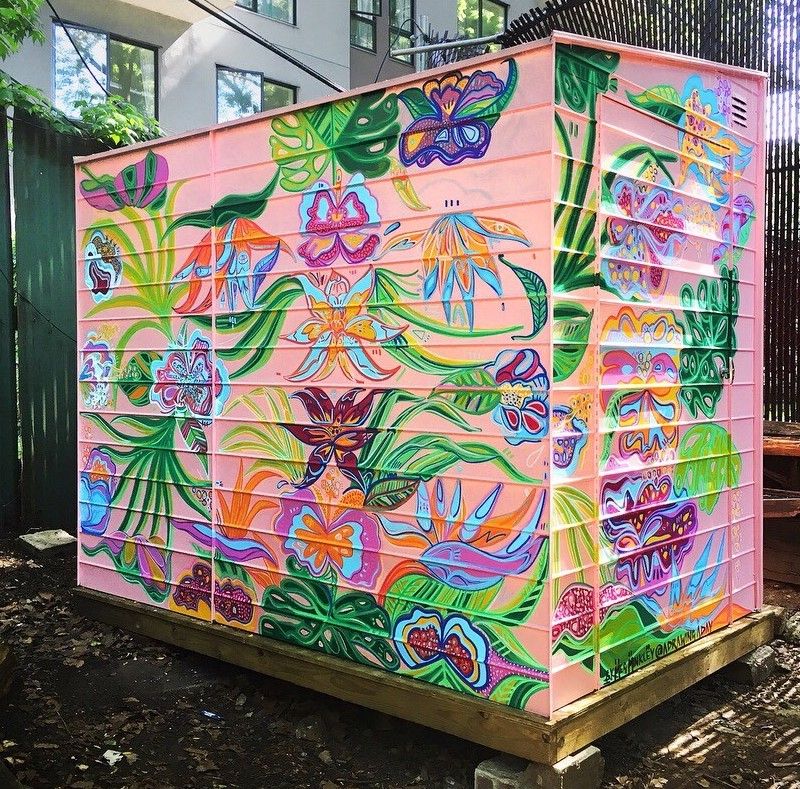
Meg Minkley’s ‘Fiesta Forever’; Photo by Meg Minkley courtesy of NYC Parks
Evan Bishop’s Hip-Hop for Hope! and Meg Minkley’s Fiesta Forever are two projects that are part of NYC Parks GreenThumb’s Art in the Gardens Shed Murals project. A project within GreenThumb’s community gardening program, which consists of over 550 community gardens, it brings local artists to community gardens to showcase their art on sheds that will be used by the gardens.
Minkley’s Fiesta Forever, located in Brooklyn’s Powers Street Garden, features illustrations of a variety of flowers that bloom throughout the city throughout the spring and summer seasons. Evoking the “re-birth of color in the city”, the vibrant illustrations and cheerful pink background encourage viewers to celebrate the fun activities and excitement of summer.
Bishop’s Hip-Hop for Hope! in the Latinos Unidos Garden located in the Bronx, is influenced by the artist’s upbringing in the Bronx during the ’70s and ’80s, where he was constantly surrounded by hip-hop. For this project, he worked with artists from ArTech, who placed their own artwork on the shed with words such as “unity” and “hope”. ArTech is supported by the AHRC, a New York organization committed to helping individuals with disabilities receive services related to work, family, and more.
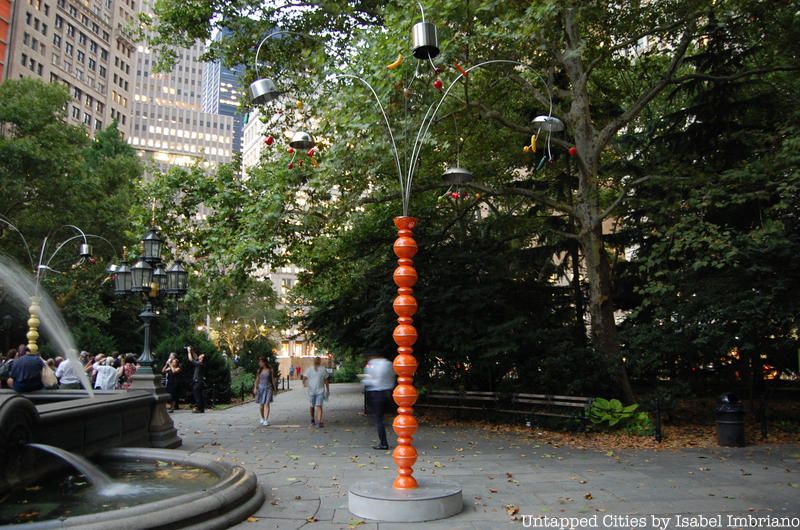
On August 7, Public Art Fund will unveil five new sculptures by New York artist B. Wurtz in City Hall Park, in an exhibition titled Kitchen Trees. Over the past 50 years, Wurtz has become well-known for working with objects that make up people’s basic needs, mainly objects that evoke themes of food, clothing, or shelter. In this installation, Wurtz expands this vision, taking everyday items like plastic bags, cans, shoelaces, and wood and arranging them in such a way that transforms this pile of objects into an art piece that “hovers between precarious fragility and formal monumentality.”
Specifically, the artist uses objects to create sculptures that resemble trees, from the trunks to the branches composed of kitchenware and plastic fruit. This installation is the first time that Wurtz has moved his work outside of the gallery, specifically to the urban landscape, where people and the built environment intermingle.
The exhibit will be on view until December 7, 2018 and you can register to attend the launch here.
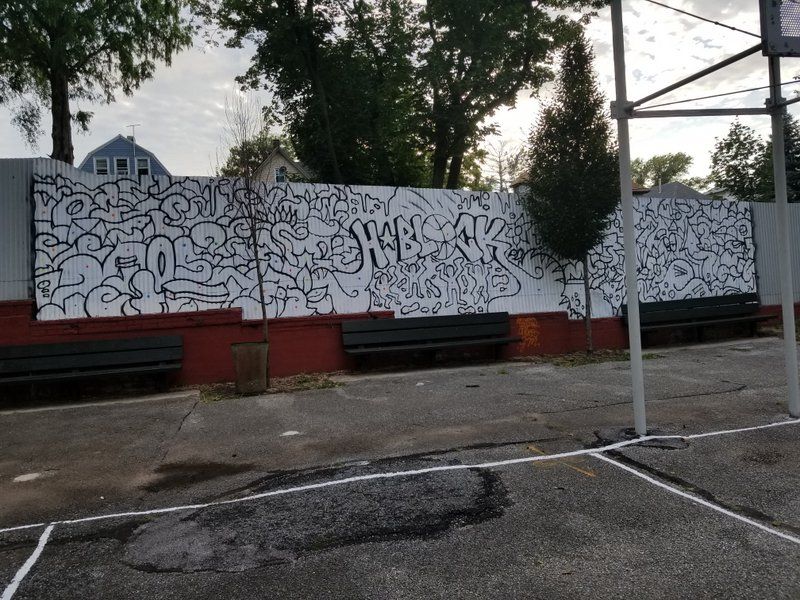
Photo courtesy of the Friends of Mariner’s Harbor Park
The Friends of Mariner’s Harbor Park, with approval of the NYC Parks’ Public Art Department, will be installing a mural at the Mariner’s Harbor Playground in Staten Island. Volunteer artist James Merlis designed the mural, which he has stenciled onto the wall.
Here comes the really exciting part: the park is encouraging people from the community to come together on August 4 from 10 AM to 2 PM for a Paint by Numbers event to collectively fill in the entire mural in just the span of a few hours. Details of the Paint by Numbers event can be found on its Facebook page.
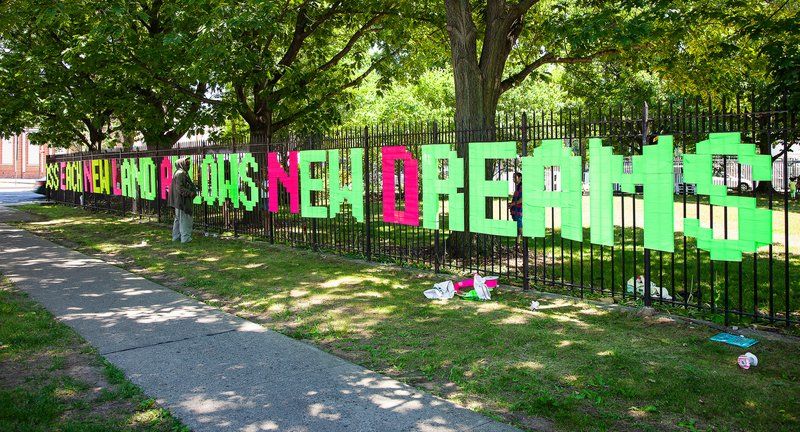
Photo courtesy of Michael Piña and NYC Parks
Until next summer, Brooklyn Hi-Art! Machine’s artwork titled Fence Weaving will be on view at the Fidler-Wyckoff House Park as part of the Nou La- We Reach! exhibit. Fence Weaving, and the larger exhibit as a whole, immerses viewers in stories and artwork that highlight pairs of themes surrounding Caribbean migration: innovation and preservation, migration and displacement, and resistance and becoming. The exhibit showcases the stories of individuals from communities like Brownsville and East Flatbush to explore the ways in which the cultural fabric of Brooklyn has been shaped by migration.

Image courtesy of James and Karla Murray
James and Karla Murray’s exhibit Moms-and-Pops of the L.E.S. is part of 10 Uniqlo Park Expressions that are on view across the city. This piece is a pop-up that debuted last month in Seward Park on the Lower East Side. Moms-and-Pops is a life-sized structure that displays four large photographs of mom-and-pop ships that have closed in the Lower East Side, such as Cup & Saucer and Chung’s Candy & Soda Stand.
The installation seeks to highlight the disappearance of small businesses like bodegas, coffee shops, luncheonettes, delis, and newsstands that used to be numerous in the Lower East Side. The artists state that the piece seeks to represent the “small businesses that were common in the Lower East Side and helped bring the community together through people’s daily interactions.”
A combination of metal and wooden materials makes the sculpture weather-proof and capable of lasting the entire year, perhaps a nod to the legacy of these now extinct businesses of the Lower East Side.
James and Karla Murray also have an exhibition that just opened at The Storefront Gallery in the Lower East Side and on Friday, August 3rd, the photographers will be hosting a workshop at an exhibition they curated with multiple artists inside the Jefferson Market Library. You can RSVP for the free event here, which will feature refreshments served including pastries and cookies from Veniero’s Pasticceria, cheese platter from Murray’s Cheese, assorted candies from Economy Candy, Cold brew coffee from Joe Coffee, and chocolates from See’s Candies and beer from Lagunitas.
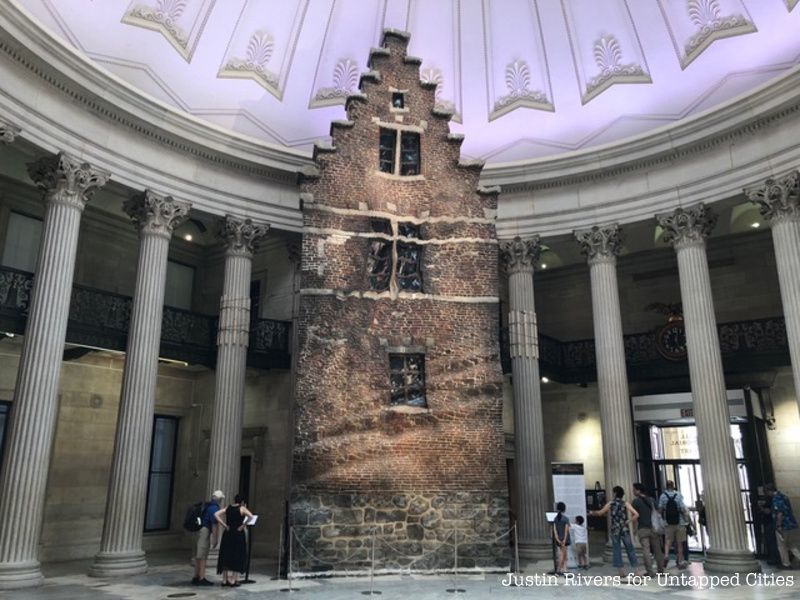
Brian Tolle’s Eureka is a towering 40-foot sculpture inside Federal Hall. This piece pays homage to New York’s Dutch colonial history by featuring a tall brick facade of a canal house in the style that was common in 17th century New York. However, there is a twist: instead of featuring a flat replica of a typical facade, Tolle choose to create one that appears to be rippling and distorted. When asked about this artistic decision, Tolle states that the piece is a nod to New York’s “fluid, but troubled, transformation from a Dutch seat of power to British colony, to an American platform for diversity and democracy.”
Federal Hall serves as a fitting location for this installation in that in the 1700s, the Federal Hall site was used as a city hall, a site where numerous historic events like court cases and political meetings took place. Tolle’s piece is reminiscent of this monumental, turbulent history.
Eureka will be on view until September 8.
To learn more about the Dutch history of New York City grab tickets to our upcoming tour of the Remnants of Dutch New Amsterdam!
Tour of The Remnants of Dutch New Amsterdam
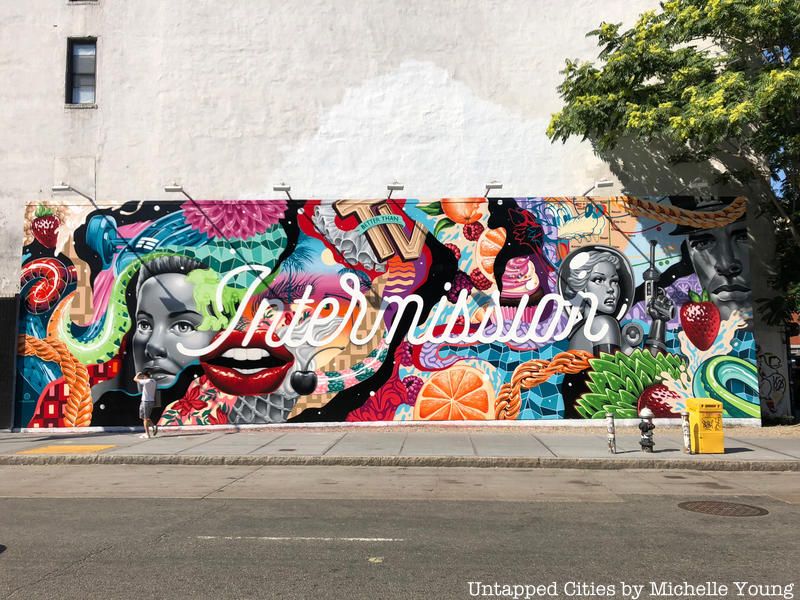
In July, acclaimed street artist Tristan Eaton completed work on a mural on the Houston/Bowery Wall, prompting much anticipation for the finished piece. The mural combines images and themes from cinema and pop culture, evoking the nostalgia of the cinematic Manhattan, where beauty and grunge simultaneously existed in the age of matinees and showgirls.
A notable detail of the mural is present in the background details. In the upper right corner of the piece a subway map is depicted in which notable street artists are listed as stops on the map, including Tats Cru, Crash, Futura, Daze and more.
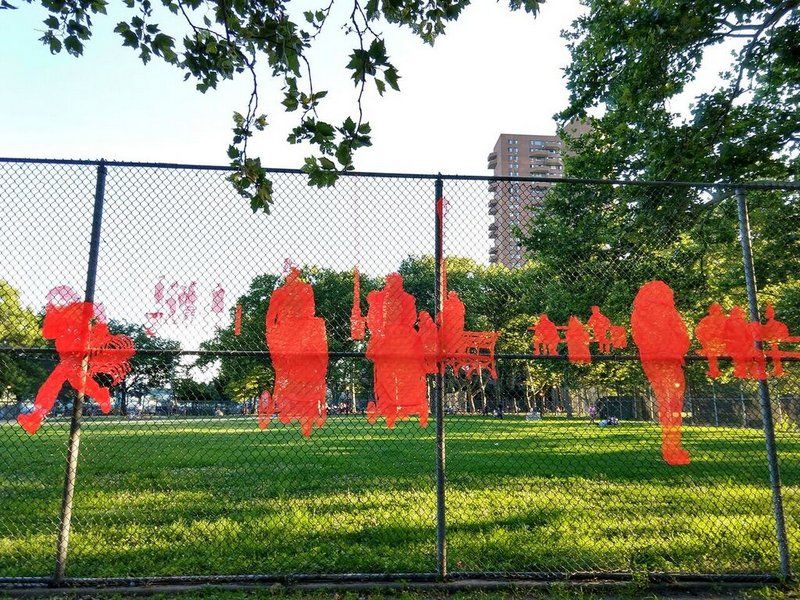
Photo by Harumi Ori courtesy of NYC Parks
From now until July 9, 2019, Harumi Ori’s I Am Here will be on view in East Harlem’s Thomas Jefferson Park. The artist states that the sculptures are inspired by a poem by Japanese poet Michio Mado, which advances the idea that meaning can be found in existing in everyday life. Ori began the project by taking a photo of an ordinary location every day from the same viewing position and at the same time. She was inspired by the photos which each exhibited unique variations, despite the fact that the conditions in which the photo were taken were held constant.
The installation consists of orange industrial mesh that the artist folded and sewed to create a three dimensional portrait of the park in a way that mirrors the shapes and motions of the people and inanimate objects that fill the park.
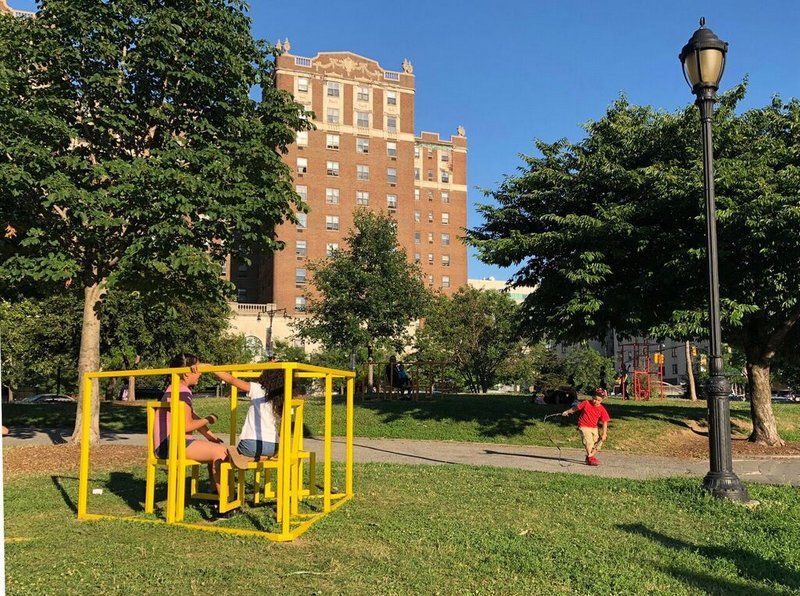
Photo by Dionisio Cortes Ortega courtesy of NYC Parks
Last month, Sitting Together, created by artist Dionisio Cortes Ortega, opened to the public in the Bronx’s Joyce Kilmer Park as part of the UNIQLO Parks Expression Grant program. Purposely placed by the neighboring Bronx Supreme Courthouse, the installation subverts the established proceedings of courtroom cases, prompting viewers to consider the ways in which conflicts, whether between individuals or the law, are resolved in a systemized manner that oftentimes doesn’t encourage empathy and understanding. The sculptures place the plaintiff and defendant within modified witness stands to encourage these qualities of empathy and understanding. Furthermore, the color and seating direction in each sculpture addresses the severity of the conflicts.
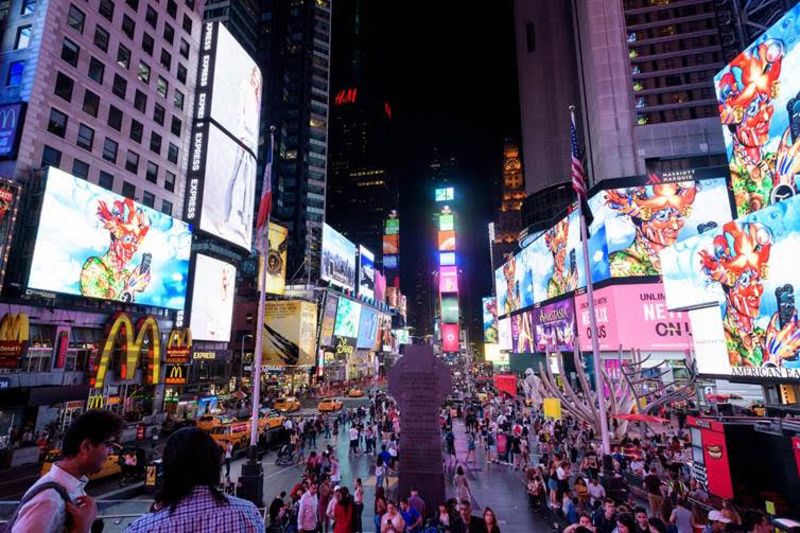 Carla Gannis’ Portraits in Landscape, Courtesy of Ka-Man Tse for Times Square Arts
Carla Gannis’ Portraits in Landscape, Courtesy of Ka-Man Tse for Times Square Arts
Alice Dunseath’s You Could Sunbathe in this Storm (Slight Return) is part of Times Square’s Midnight Moment. Each day all month, from 11:57 p.m. to midnight, Dunseath’s display which incorporates video art, animation, and live action, overtakes Times Square.
Times Square Arts states, “The work begins with the dramatic collapse of what could be a child’s architectural construction of three-dimensional plaster objects… [which] become animate, transforming and interacting in playful flirtatious movements… overtaken by intensely chromatic, crystalline formations, evoking vast, otherworldly landscapes.”
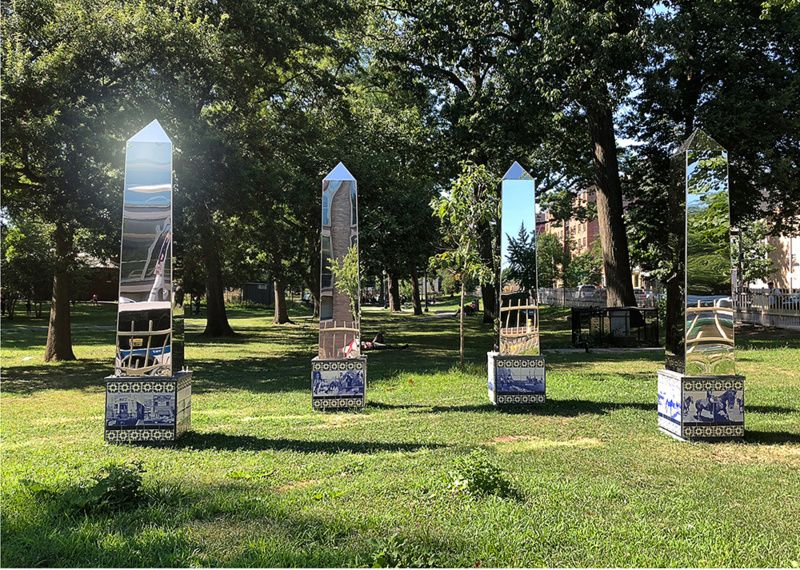 Photo by Rose DeSiano Courtesy of New York City Department of Parks & Recreation
Photo by Rose DeSiano Courtesy of New York City Department of Parks & Recreation
Rose DeSiano’s Absent Monuments, also part of the UNIQLO Parks Expressions Grant, is on view in Queens’ Rufus King Park until June 2019. The installation is constructed of several mirrored obelisks that feature Dutch Delft photographic tiles that explore the history of the park, as well as floral tiles inspired by Native American patterns. The mirrored surfaces confront the viewer with their reflection and subtly prompt them to reflect on their own identity and their situation within the history of Jamaica, Queens, which is full of colonization, war, abolitionism, immigration, and rural urbanization. Simultaneously, the tiles pay homage to the history of Native American people and address the patterns of cultural displacement that have occurred in Queens.
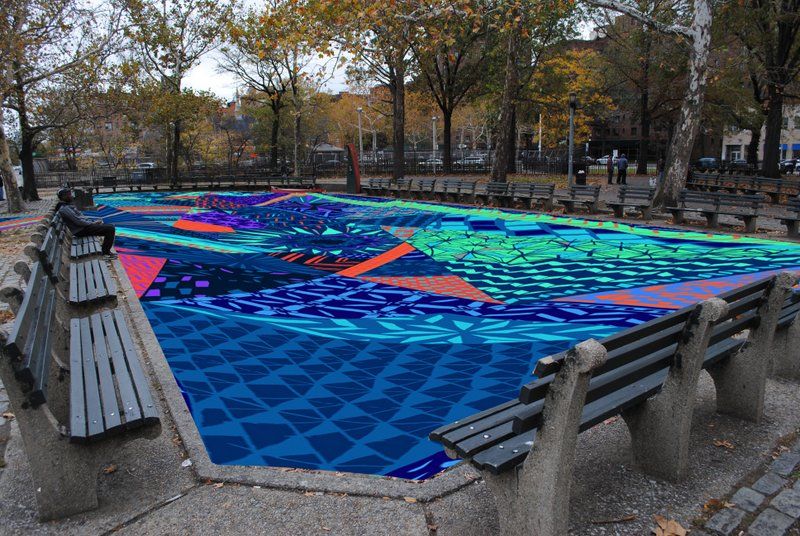
Courtesy of NYC Parks
An installation by artist Cara Lynch titled I’m So Happy You’re Here has just debuted at Virginia Park in the Bronx as part of the UNIQLO Park Expressions Grant program. Lynch has created numerous public art projects, which include pieces here in New York. A common theme throughout her work is that of tension; in I’m So Happy You’re Here, she explores tensions between high and low and the contrast of public and private space. The mural, which is painted on the ground, contains patterns that are reminiscent of traditional parquet flooring, a status symbol found in the homes of wealthy individuals.
By deliberately choosing to reference these patterns in a public mural, Lynch twists the manner in which these patterns were typically viewed, not only elucidating the tensions that exist between the private and public spheres, but challenging notions of
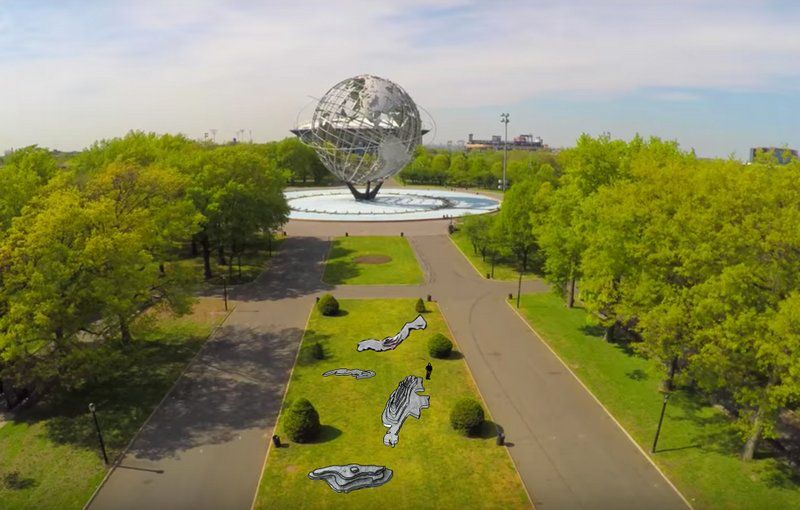
Courtesy of NYC Parks
Around the Unisphere in Flushing Meadows Corona Park sit the sculptures that comprise Zaq Landberg’s Islands of the Unisphere (yet another of the UNIQLO Parks Expressions Grant program). The Unisphere monument, a fixture of the park, is a large sculptural globe with recognizable land masses, but without labels and borders. Landberg expanded on this famed monument by choosing islands off of the Unisphere, recreating them at scale, and placing them horizontally on the grass. The islands act as seating, stages, and meeting places, community spaces that encourage people to forge connections and reflect on the tremendous diversity of Queens.
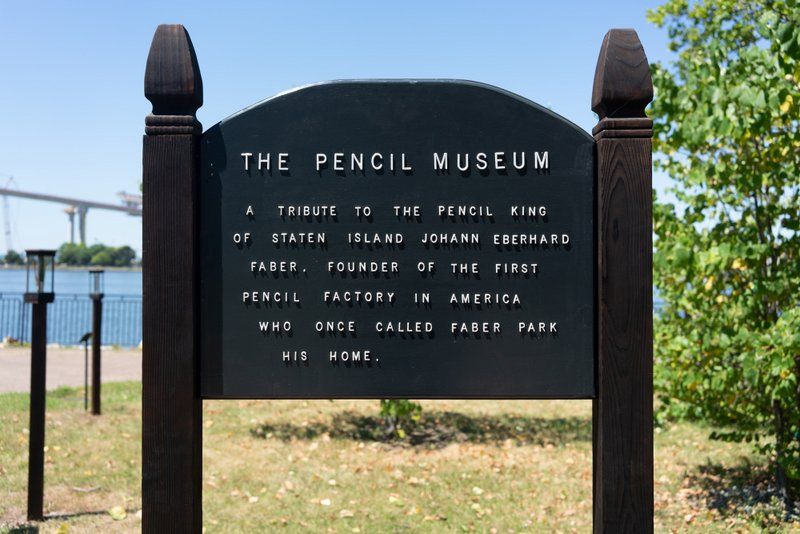
Photo by Jackie Mock courtesy of NYC Parks
On Staten Island’s Faber Park, artist Jackie Mock has installed The Pencil Museum, an exhibit that educates viewers about a somewhat obscure slice of New York history. Featuring hand-crafted cases that display antique pencils and writing instruments, the piece pays homage to the influential Eberhard Faber Pencil Company. When it was founded, the factory was the only one of its kind in America, and eventually created one of the most commonly used goods, all manufactured in New York. Faber Park was once the site of Faber Mansion, the property of entrepreneur Johann Eberhard Faber, the “Pencil King of Staten Island”.
Fun fact: the Eberhard Faber Pencil Company Historic district in Greenpoint, Brooklyn is one of the smallest in New York City, and more information can be found on our list of the 10 Smallest Historic Districts in NYC.
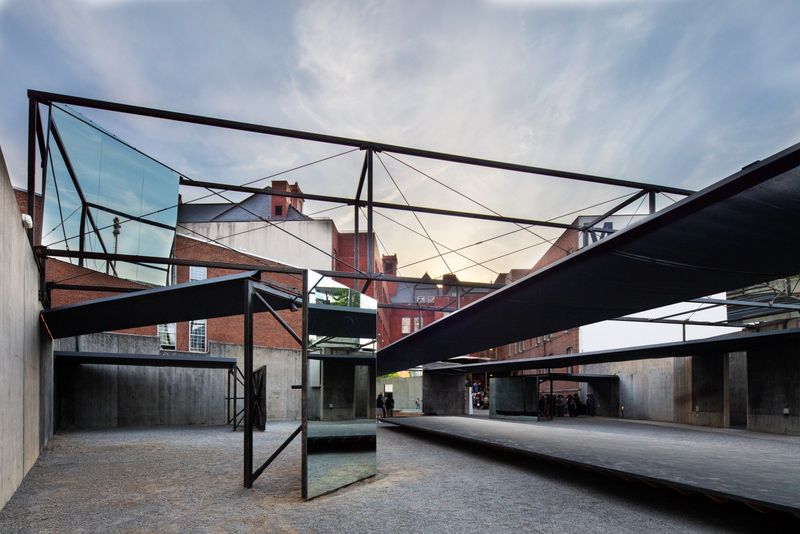
Photo by Pablo Enriquez courtesy of MoMA PS1
Hide and Seek, designed by Jennifer Newsom and Tom Carruthers of Dream the Combine, will be on view in the courtyard of MoMA PS1 through September 3. This piece was the winning project of the 19th edition of the Young Architects Program at MoMA, which presents emerging architects with the challenge of designing an outdoor installation that is not only innovative, but addresses environmental issues.
MoMA describes Hide and Seek as a “responsive, kinetic environment that features eight intersecting elements arrayed across the entirety of the MoMA PS1 courtyard” that is “inspired by the crowd, the street, and the jostle of relationships found in the contemporary city.”
 Photo by Alexander Atkins, courtesy of the artist
Photo by Alexander Atkins, courtesy of the artist
In July, Tribeca Park unveiled artist Rebecca Manson’s first public sculpture, a monumental public art piece titled Come Closer and the View Gets Wider. The piece consists of thousands of handmade, glazed porcelain parts that are fused together to create a magnificent eight-foot orb.
As the title and the composition of the piece suggests, the perspective at which the piece is viewed impacts the viewer’s perception. Each of the thousands of hand-crafted parts appear rather insignificant on their own and from afar, appear to blend in to the seamless piece. Collectively, the small pieces are crucial to creating the whole piece, which stresses the impact of small things coming together to create something greater.
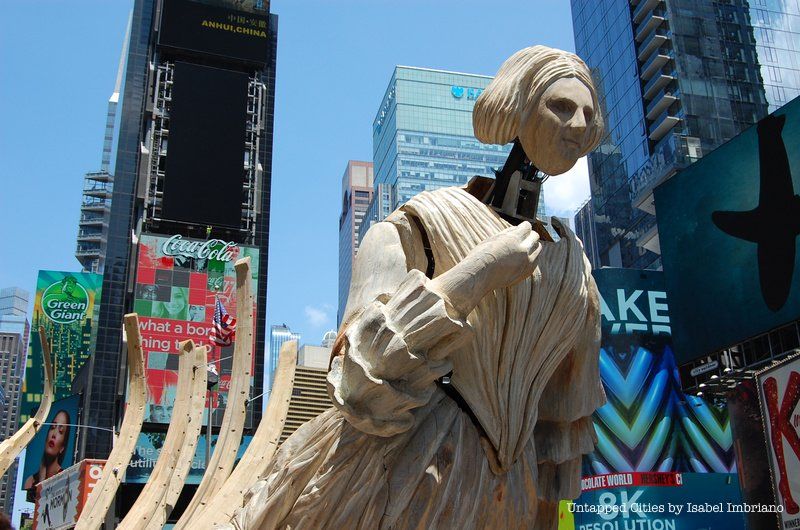
In July, Times Square Art, No Longer Empty, and Queens Museum presented the opening of Mel Chin’s Wake sculpture and mixed reality piece Unmoored as part of Mel Chin: All Over the Place, a exhibition of Chin’s work that is located not only in the Queens Museum but all over the city. According to the Queens Museum, Wake “is a presence evoking the hull of a shipwreck crossed with the skeletal remains of a marine mammal bleached by erosion and time.”
Unmoored is a collaboration between Mel Chin and Microsoft that aims to tackle the topic of climate change and prompt discourse on the subject. The piece is a mixed reality installation that “explores a potential future where global warming has gone unchecked”; it uses technology like the Microsoft HoloLens to allow viewers to explore an underwater version of Times Square to prompt participants to grasp the potential reality of climate change.
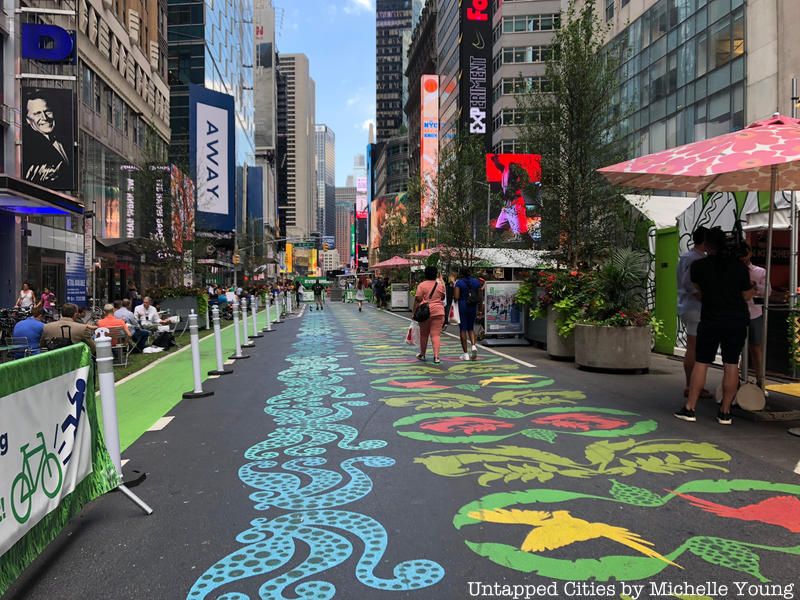
The Garment District’s Urban Garden is an outdoor event/installation in which the two blocks of Broadway between 39th and 41st streets are closed to traffic in June and July in an effort to bring more public and green space, art and culture, and activities to the Garment District. Created by artists Nancy Saleme and Patricia Cazorla, “Ararauna” is a 400 foot art walk that runs down the street itself.
The Urban Garden celebrates the reclaiming of urban space from motorists, as it is blocked off to traffic, and pedestrians and cyclists flood the space. With this transformation of the space comes expanded biking areas, more trees and grass, free fitness classes, and food vendors.
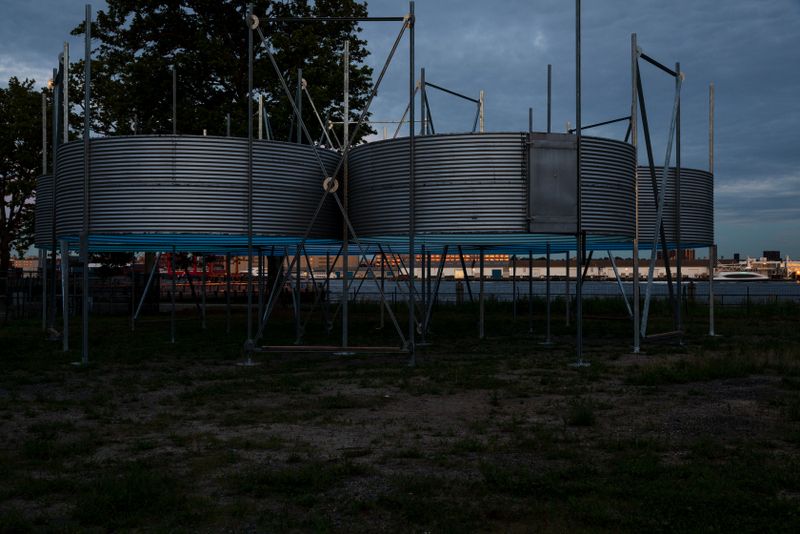
Photo by Lindsey Hadlock courtesy of Cornell University
Oculi, the winning piece of the 2018 City of Dreams competition, was unveiled on Governor’s Island in late June and will be on view through the fall. The City of Dreams competition encourages architects and designers to turn their visions and creativity towards sustainability and ponder environmental problems such as the depletion of resources.
The piece is constructed of discarded grain silos that are elevated to create a variety of shadow patterns, creating an art piece while evoking the imagery of New York’s industrial age. Sustainability is not just present in the construction of the piece, but also in its demolition, in which the the silos are projected to be repurposed for components of experimental housing.
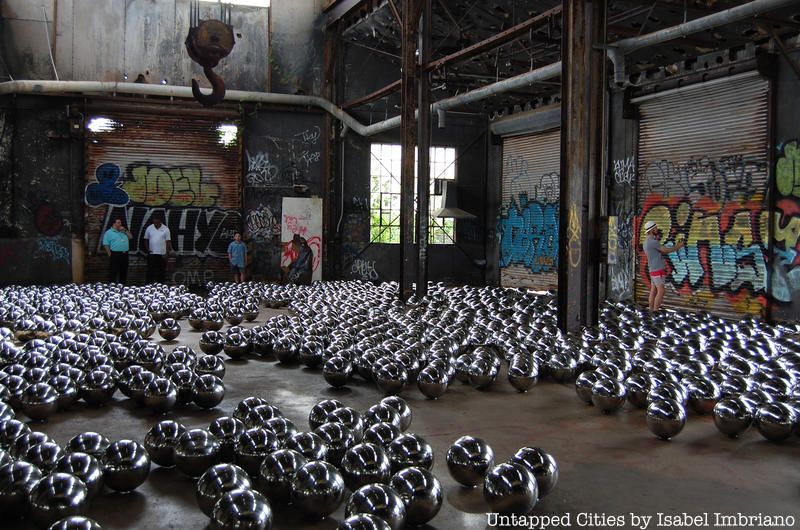
Through September 3, MoMA PS1 is displaying Narcissus Garden by Yayoi Kusama as part of the Rockaway! 2018 public arts festival presented in conjunction with the Rockaway Artists Alliance and Jamaica Bay-Rockaway Parks Conservancy at the Gateway National Recreation Area at Fort Tilden. The piece is situated within a former train garage, a relic from the days in which Fort Tilden served as an active military base.
Kusama’s piece is composed of 1,500 mirrored stainless steel spheres that reflect its abandoned industrial surroundings, simultaneously highlighting the area’s history and the more present and still visible history of the damage from Hurricane Sandy in 2012.
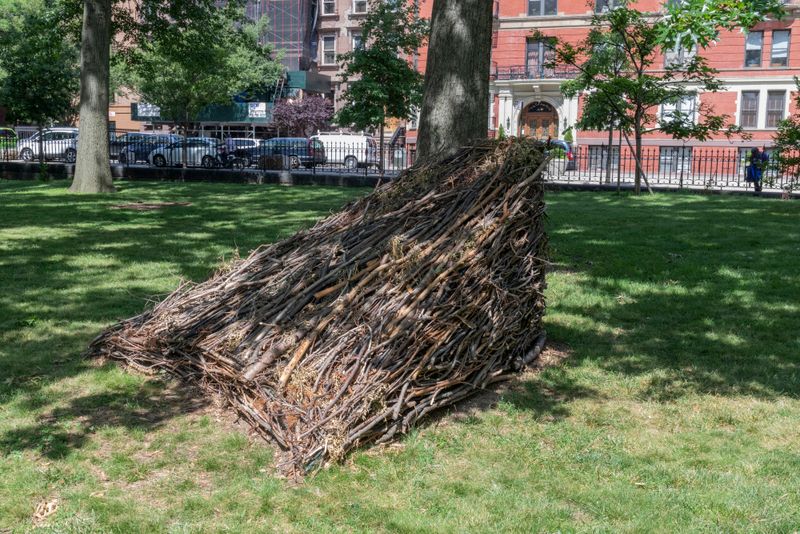
Photo by Adam Reich courtesy of the artist and Susan Inglett Gallery
Maren Hassinger: Monuments is an installation in Marcus Garvey Park and sponsored by the Studio Museum in Harlem that runs from through July 10, 2019. The exhibition features eight site-specific sculptures by artist Maren Hassinger who used branches to create sculptural forms that evoke aspects of the park landscape, like an oval near the pool, for instance.
Because she is a Harlem-based artist, Hassinger has been associated since the Studio Museum since the 1980s. With Monuments, she took great care to make it “a project made in Harlem and for Harlem.” Specifically, she created the works with volunteers from the Studio Museum’s Teen Leadership Council and the Expanding the Walls program.
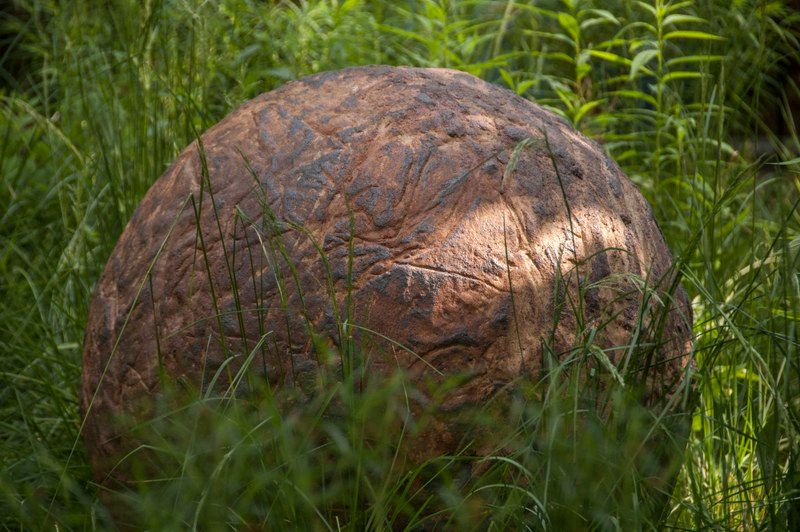
Photo by Weronika Kwiatkowska courtesy of Ziemia
Ziemia: Our Stories Are Written in Soil is an installation in McGolrick Park in the Greenpoint neighborhood of Brooklyn. Created by Martynka Wawrzyniak with the Polish Cultural Institute, the piece evokes themes of nature, place-based identity, and community.
Ziemia was constructed as part of a community effort: the clay from which the piece was constructed was excavated in Greenpoint and the soil upon which it rests was collected from participating residents from places in which they culturally identify. Many Polish families have lived in Greenpoint for generations, and thus, Kwiatkowska travelled to Poland to collect soil for her own piece. The public location of the piece encourages individuals of different identities to exchange dialogue as the neighborhood undergoes change.
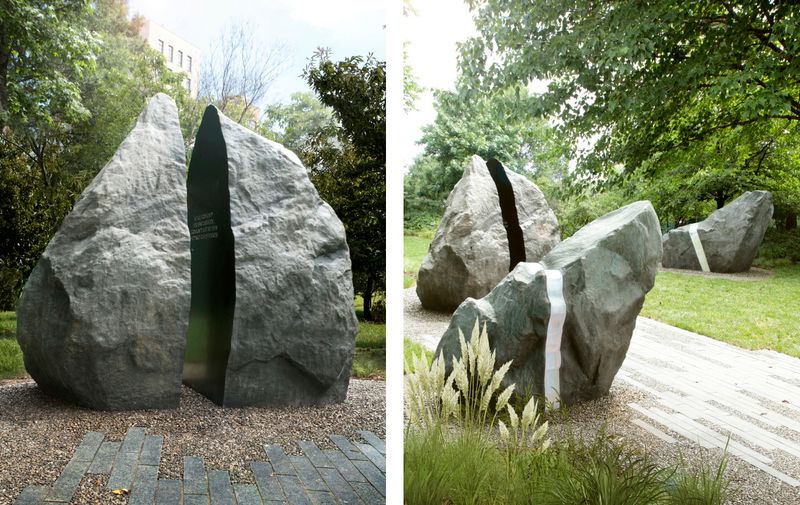
Photo by Anthony Goicolea
In late June, artist Anthony Goicolea opened the New York City’s first LGBTQ memorial in Hudson River Park. The work is composed of large pieces of glass embedded into steel boulders within the green landscape of the park.
After the Pulse nightclub shooting in 2016, Governor Cuomo created a commission that would be responsible for the installation of a memorial to honor the victims, as well as highlight the role of New York in LGBTQ history and the city’s commitment to its LGBTQ residents. The glass panels in the installation interact with light to emit a faint rainbow glow to pay homage to an iconic symbol of the LGBTQ community.
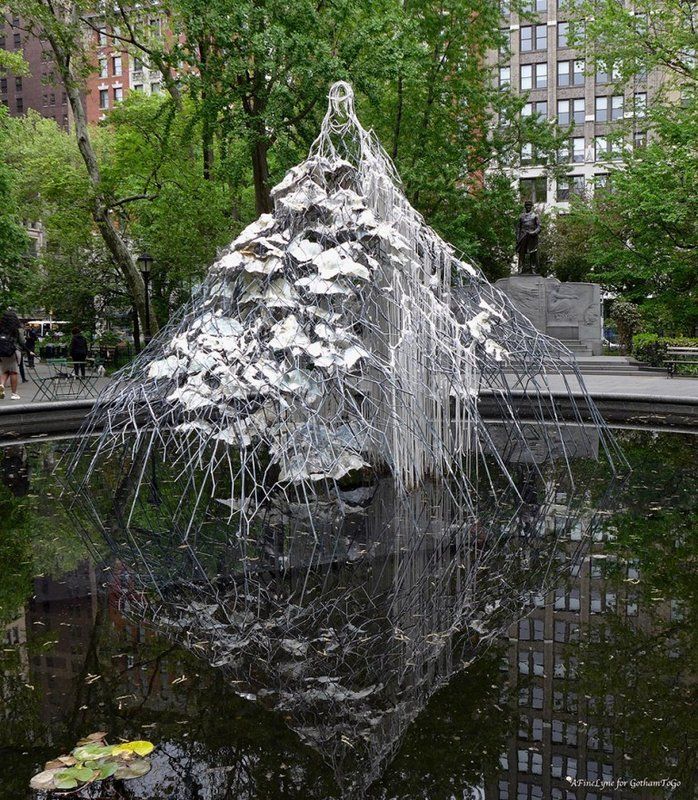
Photo by Lynn Lieberman/Gotham to Go
On view until September 3rd, Madison Square Park will welcome a new public art exhibition, Delirious Matter, by Brooklyn-based artist Diana Al-Hadid. Delirious Matter is Al-Hadid’s first major public art project, and The Madison Square Park Conservancy’s thirty-sixth exhibition, which will feature six new sculptures to be installed across the park’s central Oval Lawn, peripheral lawns and northern reflecting pool.
The Madison Square Park Conservancy notes that Al-Hadid’s integration of sculpture with plant material is a first for the program. The walls, which deceivingly appear fragile, will stand in direct contrast to the concrete and steel skyscrapers surrounding the park. For more on the project, visit madisonsquarepark.org, and join the conversation via social media by using the hashtags #MadSqArt, #DianaAlHadid, and #MadSqDeliriousMatter.

At 85 Broad Street, a building full of historical secrets if you know where to look, is in the midst of installing an impressive piece of artwork on the sidewalks encircling the building in Lower Manhattan. It’s inspired by the 1767 map, “The Plan of the City of New York in North America” made by British military officer Bernard Ratzer from 1766 to 1767. Under this map, our readers may recall, there’s a yellow brick outline that marks the walls of Stadt Huys, the original city hall, one of many signs of Dutch New Amsterdam that still remain.
The map, designed by FXCollaborative and made by Jessup Manufacturing Company is made of a foil-backed proprietary material called Asphalt Art, and laid down piece by piece. Fun things of note on the map besides Stadt Huys and Lovelace Tavern, where you can still see the archaeological excavation of the tavern through glass, are the now-lost Princess Street, the old synagogue (original the old mill of Dutch New Amsterdam, home to the congregation of the Sephardic Jews who arrived in 1654 from Spain and Portugal), and the old slips of Lower Manhattan.
You can discover this and more on our tour of the Remnants of Dutch New Amsterdam!
Tour of The Remnants of Dutch New Amsterdam
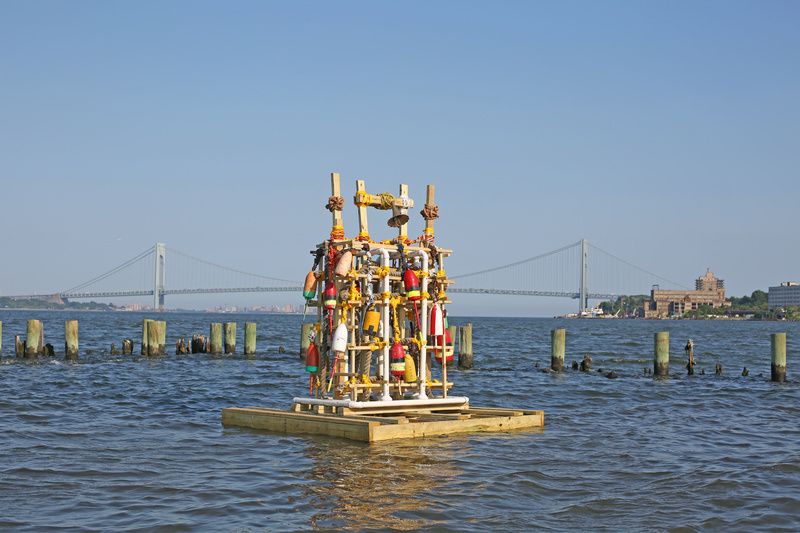 Photograph courtesy of Design Trust for Public Space
Photograph courtesy of Design Trust for Public Space
Sonic Gates is a public art installation that features a series of eight sound sculptures and murals in Staten Island placed along the waterfront, on Bay Street, and in Tappen Park. The installation is part of a larger project titled Future Culture: Connecting Staten Island’s Waterfront by the Design Trust for Public Space in partnership with Staten Island Arts.
Works include the piece in the photograph above, which was made by Arthur Simms and is on display in the harbor off the Stapleton Esplanade, and a piece by DB Lampman, on display in Tappen Park, which consists of an assemblage of wind chimes that hang over the head of its viewers and encourages them to engage with the piece using senses besides sight.
“The Future Culture pilots will highlight our borough’s rich cultural assets, from the Bay Street commercial corridor bustling with restaurants, stores and art centers, to Parks locations where dynamic community activities are taking place, to the spectacular waterfront, where we are reflecting Staten Island’s deep maritime heritage,” said Elizabeth Bennett, Executive Director at Staten Island Arts.
Akin to the Design Trust for Public Space’s initiatives to reactive underutilized spaces under elevated highways (to be covered later in this article), this initiative looks to “inspire Staten Islanders and visitors to walk the underused pathways and unleash new possibilities for regenerating public spaces as a valuable community asset,” said Susan Chin, Executive Director, Design Trust for Public Space.
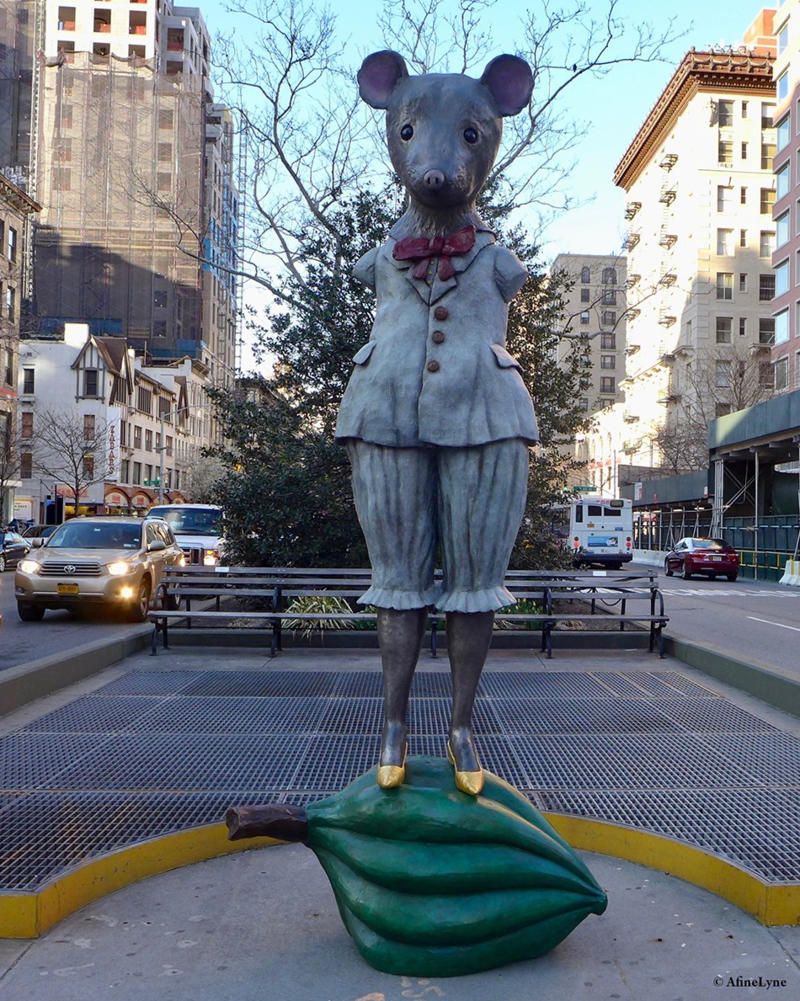
‘Ms. Mighty Mouse’ on 79th Street; Photo by Lynn Lieberman/Gotham to Go
The Broadway Mall Association debuted Kathy Ruttenberg on Broadway: In Dreams Awake. The exhibit includes six works featured on the Broadway center mediums, located on 64th, 72nd, 79th, 96th, 117th, and 157th Streets.
Each sculpture — described as a combination of human, animal and plant forms — is made from cast silicon bronze, and range between 6 feet to 15 feet in height. (Some even feature LED lighting!) The sculptures take inspiration for their surroundings; for instance, Ms. Mighty Mouse on 79th Street dreams of the cheese at nearby Zabar’s and All the World’s a Stage, which depicts a singing figure, is an allusion to the nearby Lincoln Center.
The exhibit will be on view through February 2019.
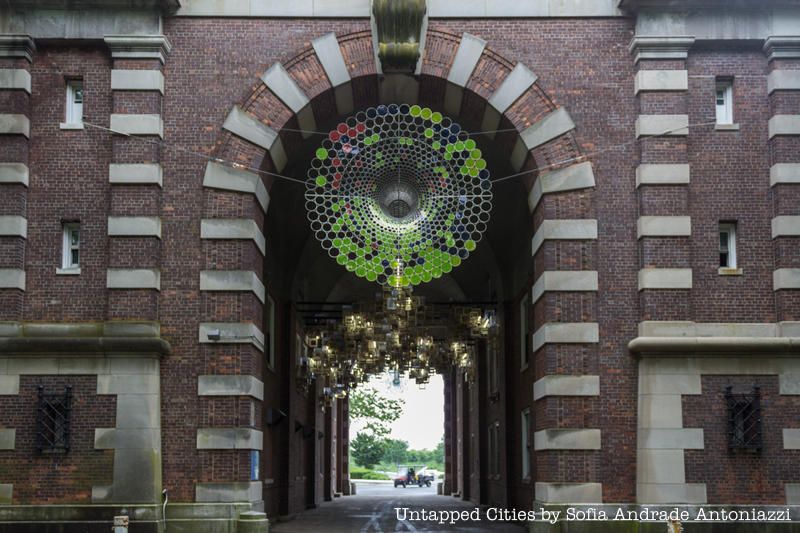
Never Comes Tomorrow by Jacob Hashimoto in the Liggett Hall archway
In June, Governors Island unveiled two impressive site specific art installations, both by Jacob Hashimoto. In the archway of Liggett Hall (a former Army barracks building that is the size of the Chrysler Building on its side), is an installation made of hundreds of wooden cubes and enormous steel funnels. The work, entitled Never Comes Tomorrow is meant as a threshold that connects Governors Island’s Historic District and the new parks, which include The Hills.
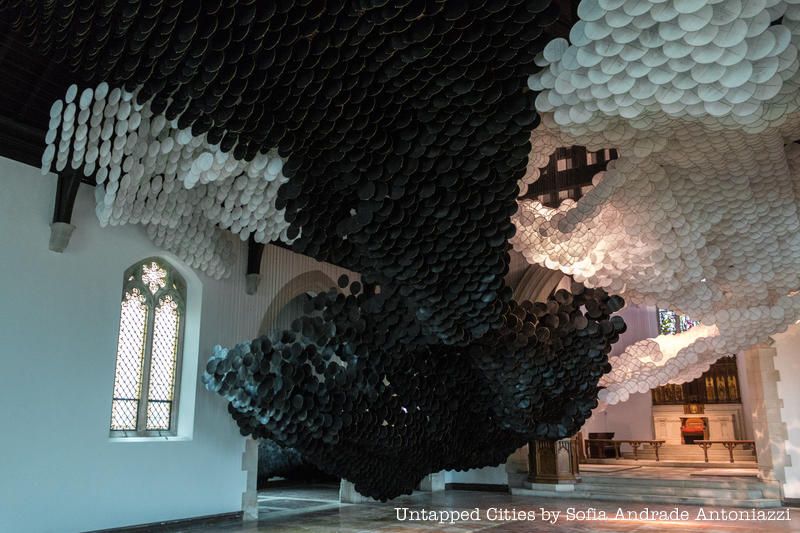
Eclipse, also by Jacob Hashimoto in the St. Cornelius Chapel on Governors Island
Another work by Hashimoto, Eclipse, is located in the St. Cornelius Chapel, featuring thousands of rice paper kites that adapt to the architecture of the historic space, while obscuring the elements. Eclipse was originally installed at the 57th Venice Architecture Biennale at the Palazzo Flangini.
The two installations will be viewable until October 31st this year.
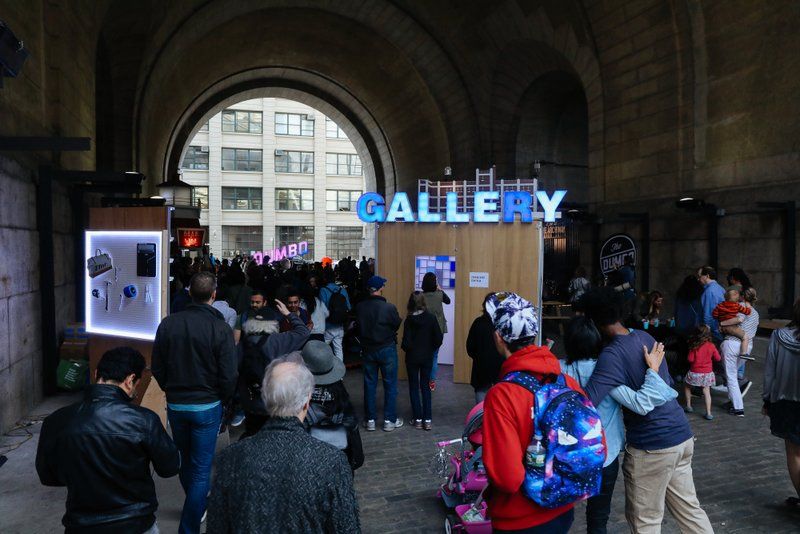
Stephen Yang courtesy DUMBO BID
Live at the Archway is an annual summer art and music series that takes place weekly. As a part of the event, a flat pack, modular pop-up gallery will be situated under the archway that is a 32-foot replica of the DUMBO gallery This Friday or Next Friday. Each week, a different Brooklyn artist is featured at In the Gallery, “a twofold art experience that jointly exhibits an artist’s work in a small pop-up gallery, and also includes an opportunity for audience members to directly engage with the artist and create a new collaborative piece each week.”

Erwin Wurm’s Hot Dog Bus is the first of three works from Public Art Fund this summer, which was followed by Flow Separation (featured earlier in this article). The bus, which will travel up and down the Brooklyn Bridge Park‘s waterfront, is a vintage Volkswagen Microbus transformed into a bright yellow food truck that will actually be serving hot dogs. All fun aside, Hot Dog Bus is intended to also question capitalistic consumption, from the bloated size of the bus itself to the “additive sculptural process of eating itself,” according to Wurm. Hot Dog Bus is a reimagining of the artist’s “Fat Car” series specifically for New York (which took form as the “Curry Bus” in Austria).
Hot Dog Bus will run through August 26th.

Three-dimensional piece by John Ahearn at Coney Island Art Walls
The Coney Island Art Walls are back for the third year, having reopened for Memorial Day Weekend featuring 41 pieces. The walls are located in what was previously an empty lot along Coney Island‘s main drag. The project is sponsored by developer Thor Equities and curated by Joseph J. Sitt and Jeffrey Deitch.
You’ll find works by street artists like Daze, Icy & Sot, Tats Cru, Nychos, Stephen (ESPO) Powers, Lady Pink, Aiko, Haze, Buff Monster, Sheryo & The Yok, IRAK, Lee Quinones and more.
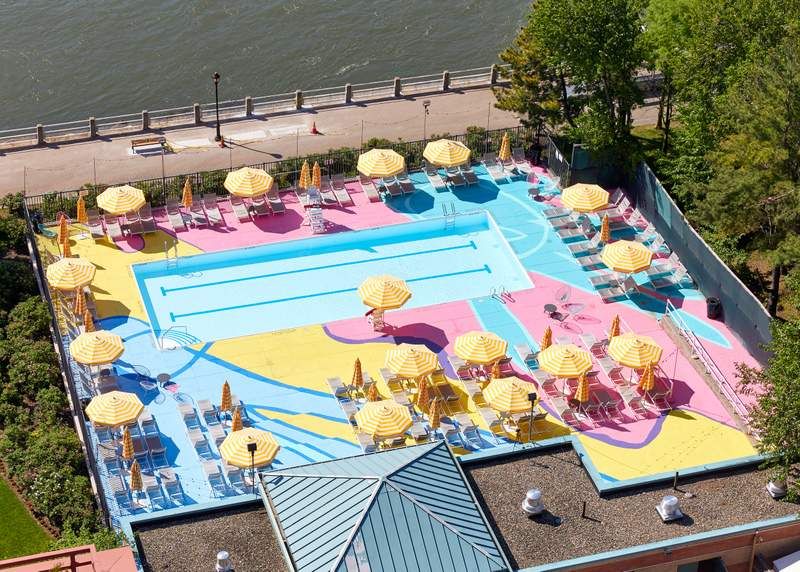
Photo by Tim Williams, courtesy of Pliskin Architecture
The Manhattan Park Pool, a summer highlight each year, is an 8,000 square foot immersive mural painted around the pool at a rental complex on Roosevelt Island. The annually changing mural is part of the design by K&Co and Pliskin Architecture, using a similar color palette but with different artists each year. This year’s work is by Technodrome1, using a design he transformed from a 2 inch computer doodle into the full installation, color by color, across about a week of painting. The pool opened Memorial Day weekend.
Previous year’s artists include HOT TEA, who painted the inaugural 2015 year pool and Gregg Emery last year.
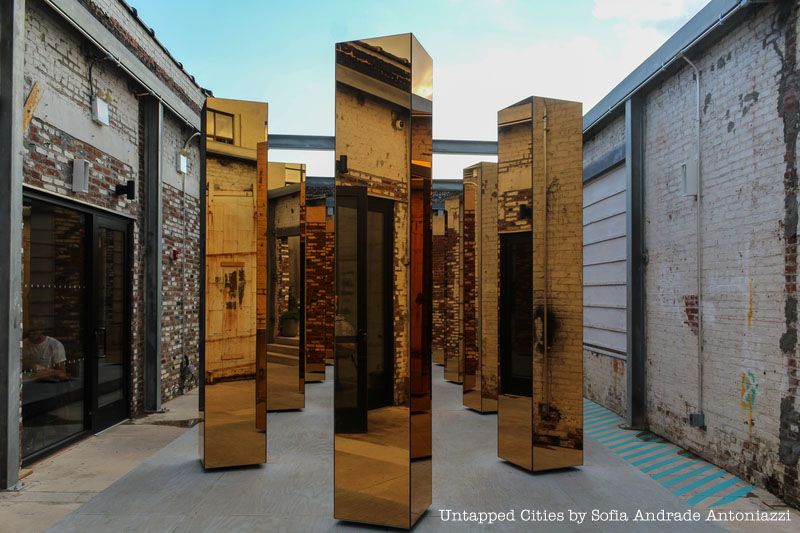
MINI and United Visual Artists, a firm based in London, have installed Spirit of the City at A/D/O, the Greenpoint creative space. Nine-foot high golden, mirrored rectangular columns, intended to evoke the skyscrapers of Manhattan and Brooklyn waterfront, will rotate. The cubes will be illuminated at night.
You can see it as part of Greenpoint Open Studios on June 3rd, or anytime until September 3rd.

During NYCxDesign Week, we were honored to be a partner of The Design Trust for Public Space in the launch of El-Space, a long-term pilot installation located under the Gowanus Expressway in Sunset Park at 36th Street and 3rd Avenue, just adjacent to Industry City. El Space is the product of a five year, critical exploration in how New York City can better activate the forgotten, unfriendly spaces beneath aging elevated infrastructure and culminates in this first pilot installation that showcases what an alternative walkway beneath the Gowanus Expressway could look like.
El-Space was designed with input from the diverse local community through charettes and on-site pop-up workshops, including work with students at Sunset Park High School and members of a Community Advisory Board.The design tests strategies for lighting, green infrastructure, and urban design for replicability, aesthetics, and of course, how the public uses and engages with it. El-Space will be installed for about a year, used to test and refine strategies for future permanent activations. For the passerby, it’s a cool visual addition to an industrial space and for the community, it has created a new meeting spot.
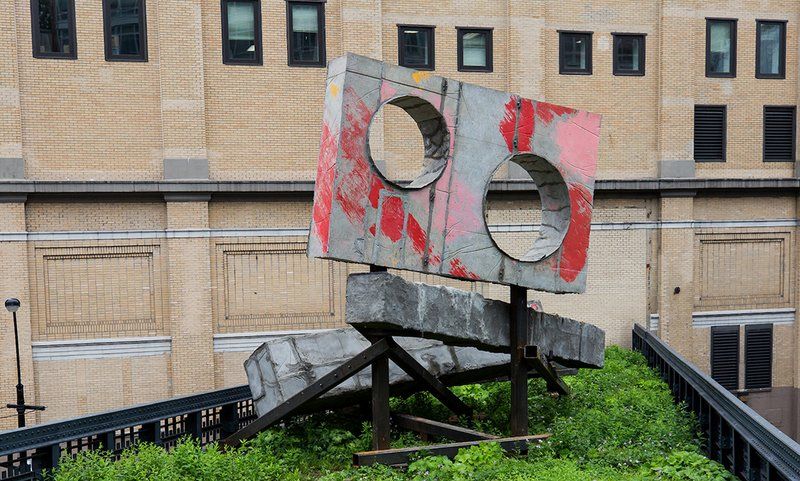
Phyllida Barlow’s prop. Photo courtesy the High Line
In addition to the Agora commissions we featured the last few months, the High Line launched two new installations at the end of May. Kerry Tribe’s Exquisite Corpse is a film that follows the entire 51-mile length of the Los Angeles River chronicling “the river’s neighbors—animal, human, and vegetal—and their stories with one minute devoted to each mile,” according to High Line Art. The film plays daily on The High Line at 14th Street at dusk from May 14 to July 18, 2018.
Then, Phyllida Barlow’s prop is a teetering concrete sculpture, reimagined from a work displayed at the 2017 Venice Biennale, and the first work to be displayed on the Northern Spur Preserve of the High Line at 16th Street, a section that once connected directly to a refrigerated warehouse that was part of the Nabisco cookie factory. Prop will be on view until March 2019.
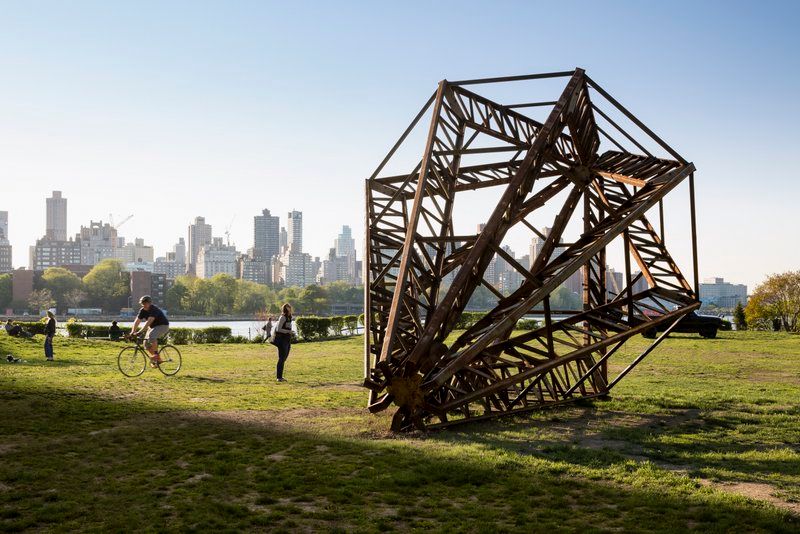
Virginia Overton; ‘Untitled (Gem);’ 2018; Courtesy the Artist, Socrates Sculpture Park, Bortolami Gallery, and White Cube; Photo by Nicholas Knight.
Socrates Sculpture Park has a park-wide installation, “Built,” all by one artist, Virginia Overton. The works, which include a crystal shaped sculpture of industrial architectural support systems, a 1990 Ford F250 pickup truck, a water feature and aquatic garden in the bed of Dodge Ram, explore the repurposing of industrial objects within a former industrial site, the park itself on the Long Island City waterfront. Built will be on display until September 3rd.
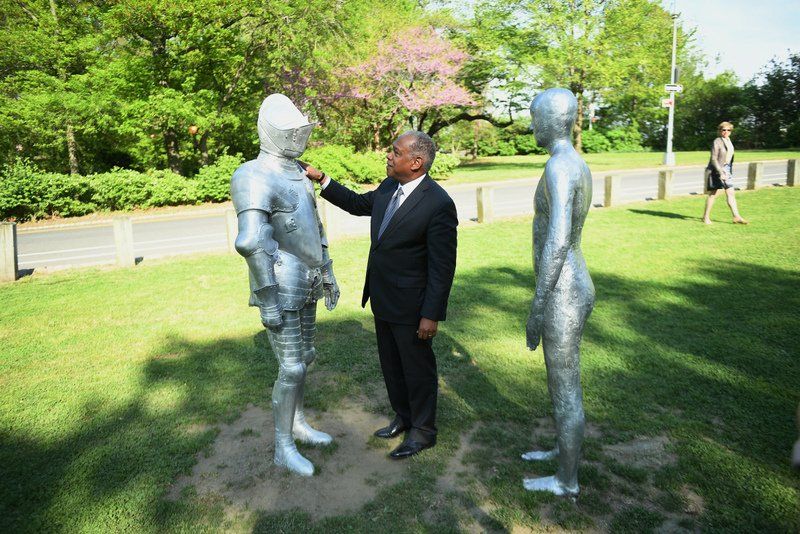
NYC Parks Commissioner Mitchell Silver with the ARMORS. Photo by Malcolm Pinckney courtesy NYC Parks
Icelandic artist Steinunn Thorarinsdotti has created ARMORS, a site-specific installation for the Cloisters Lawn in Fort Tryon Park, featuring suits of armor cast from 3D scans of armors in the Metropolitan Museum of Art permanent collection. The three casts sit “in dialogue” with one another, according to the Fort Tryon Park Trust website, which has a description of the artist and her work:
“The project’s incorporation of armor—a form that is both distinctly iconographic and foreign to the artist’s own hand—marks an aesthetic and conceptual divergence for Icelandic Thorarinsdottir, who in her home country is a celebrated pioneer (the first female sculptor to have two solo shows at the Reykjavik Art Museum, 1982 and 1987) whose androgynous figure installations have since 1976 been mounted in dozens of prominent sites around Reykjavik and beyond.”
The works will be on display until September.
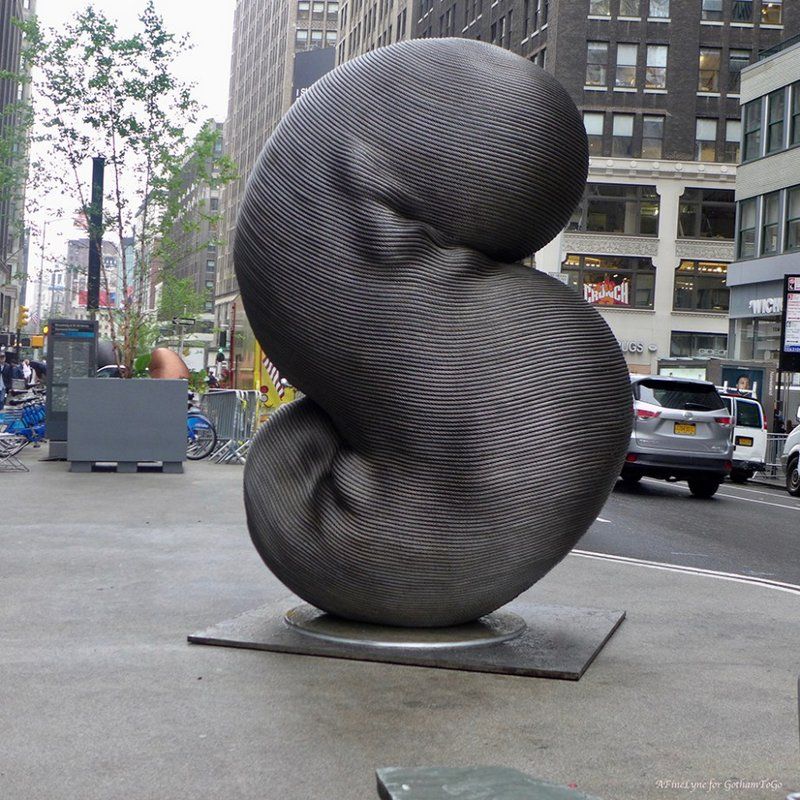 Photo by Lynn Lieberman/Gotham to Go
Photo by Lynn Lieberman/Gotham to Go
The Garment District Alliance and NYC DOT’s Arterventions has brought seven of Taiwanese artist Kang Muxiang’s large works to the Garment District Plazas between 36th Street and 38th Street. The sculptures in the series Rebirth are made from discarded steel cables from Taipei 101, Taiwan’s tallest skyscraper and the world’s tallest building from 2004 to 2010. The largest sculpture is over 10 feet tall and 3,500 pounds in weight. You can read more about each sculpture on the Garment District Alliance website. The works will be on display through September 15th, 2018.
This is the second Taiwanese artist to grace the malls of the Garment District, with Hung Yin’s A Fancy Carnival in 2016.
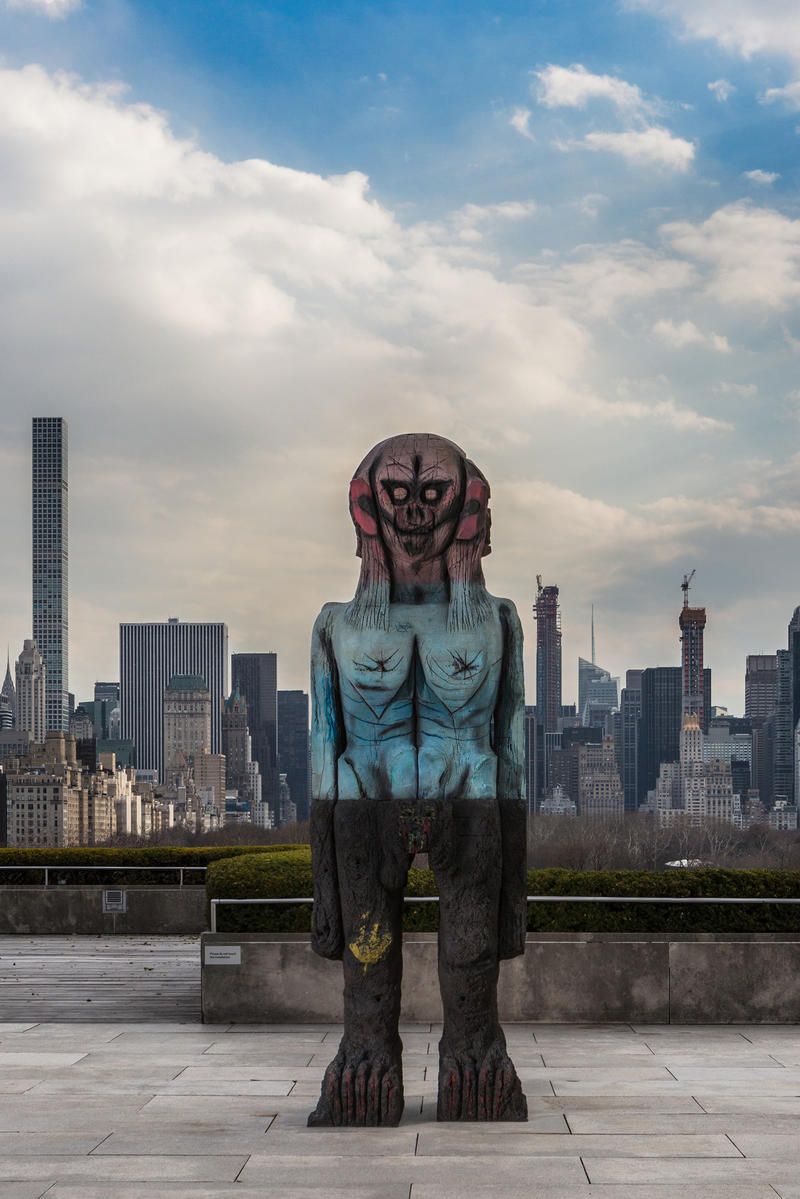 Image by Hyla Skopitz courtesy The Metropolitan Museum of Art
Image by Hyla Skopitz courtesy The Metropolitan Museum of Art
The Metropolitan Museum of Art’s rooftop site specific installation, titled We Come In Peace, is now on view to the public until October. Created by Pakistani artist Huma Bhabha, this rooftop installation is The Met’s sixth in a series of site specific commissions for the outdoor roof space. The sculptures consist of the 12-foot-tall five-headed intersex figure “We Come in Peace,” and the 18-foot-long prostrate Benaam — an Urdu word that translates to “without name.”
We Come in Peace borrows its title from the classic American science-fiction film The Day The Earth Stood Still (1951)

, a tale of first contact between humans and aliens. The sculptures are cast in bronze, but were initially handcrafted to scale by Bhabha using ephemeral materials, such as cork, Styrofoam, air-dried clay, and plastic.]
The exhibit will be on view at The Met’s rooftop garden until October 28th, 2018.
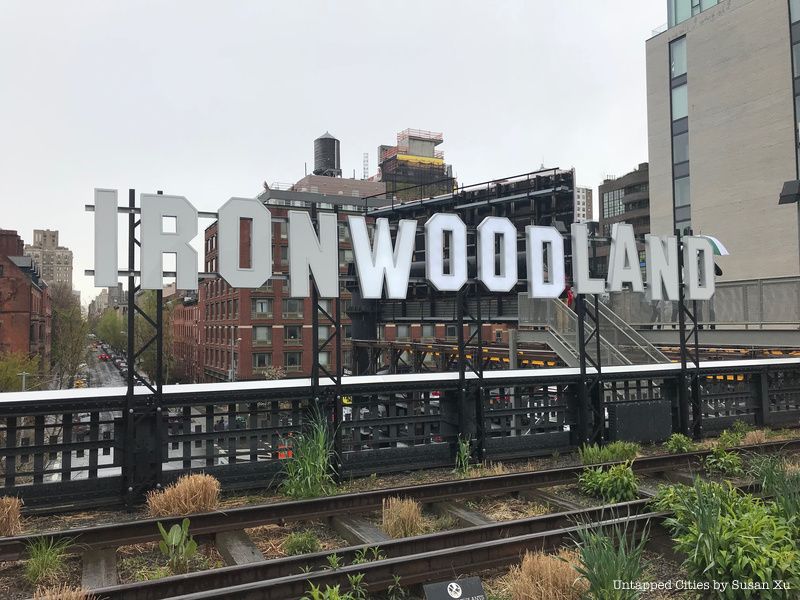
AGORA on The High Line is an outdoor group exhibition by nine artists explores the role of art and artists in defining, creating, and using public space. The name of the exhibit is inspired by the same ancient Greek word, which literally translates to a gathering place — a fitting name as New York City’s public spaces have served as a home to a plethora of artworks over the decades, ranging from WPA murals to graffiti tags.
AGORA will focus on the power of art to change society. As such, it addresses current issues, including women’s rights, mass incarceration, the environment and immigration. For instance, the work above, “C.R.E.A.M.,” by Sable Elyse Smith, is an altered replica of the Hollywood Sign that reads IRONWOODLAND — a reference both to the Ironwood State Prison and to “Hollywoodland,” the segregated real estate development that was advertised by the original sign. The exhibit will be on view until March 2019 at various locations along The High Line.
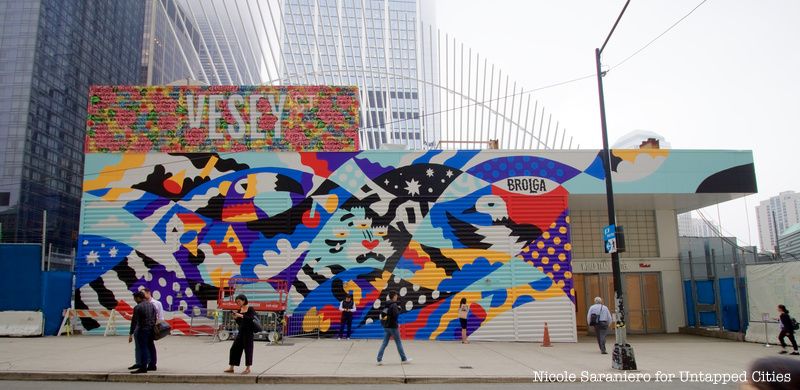
Vesey mural by Chinon Maria and Sebastian Mitre
While construction of 2 World Trade is on hold, a collection of corrugated metal sheds housing mechanical equipment have been spruced up by artists from around the world to make the area look less like a construction zone and more like a hip pedestrian throughway. The sheds, which are bounded by Greenwich, Vesey and Church Streets and the Oculus transportation hub, feature murals by Australian illustrator Brolga, Los Angeles-based artist Todd Gray, Korean-born Joohee Park, aka Stickymonger, the husband and wife team of Chinon Maria and Sebastian Mitre, Japanese-born, New York resident Riiisa Boogie, and Bronx native Hektad. When all of the murals are complete there will be 8 colorful works to see!
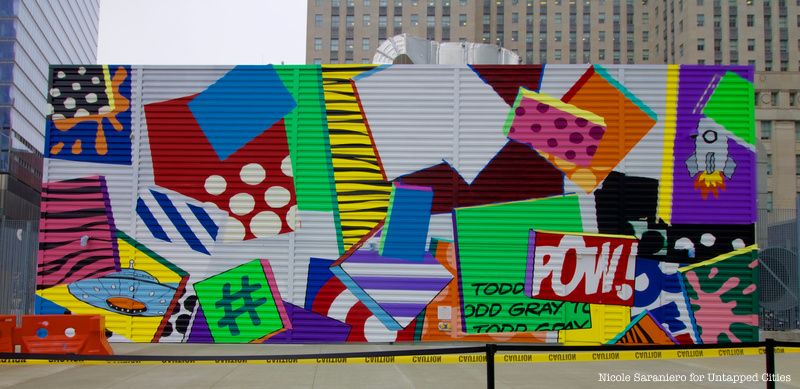
Mural by Todd Gray
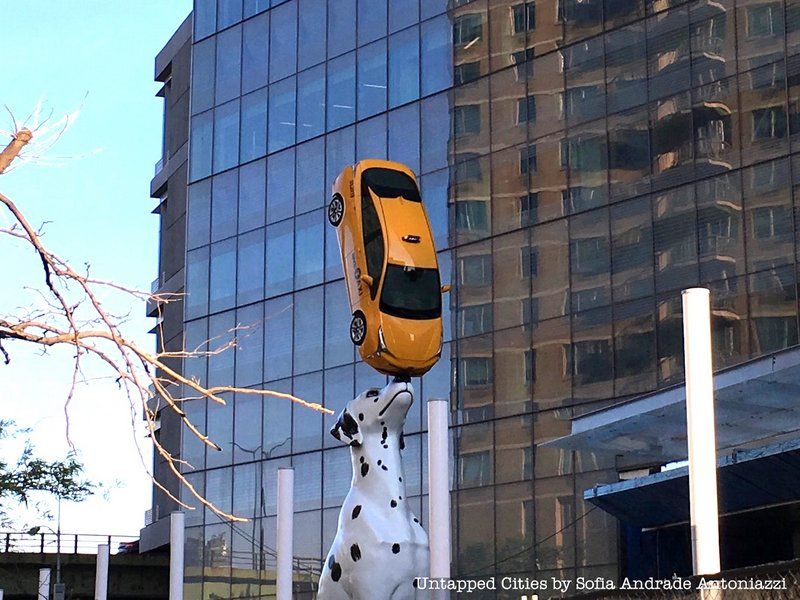
Along Manhattan’s East Side, a 30 foot Dalmatian puppy is balancing a New York City yellow cab on its nose. This new permanent sculpture, “Spot” by artist Daniel Lipski will be fully unveiled this summer as the public art of a new building, the Helen L. and Martin S. Kimmel Building, part of NYU Langone at 34th Street and First Avenue. In the meantime, you can catch it rising above construction barriers.
As reported by amNEWYORK, the cab is an actual Prius yellow cab, donated by Toyota, and although it does not have a motor, the windshield wipers will work when it’s raining. The female puppy dog is made of fiberglass and steel. Lipski is known for his playful, oversized sculpture installations that often play on iconic objects.
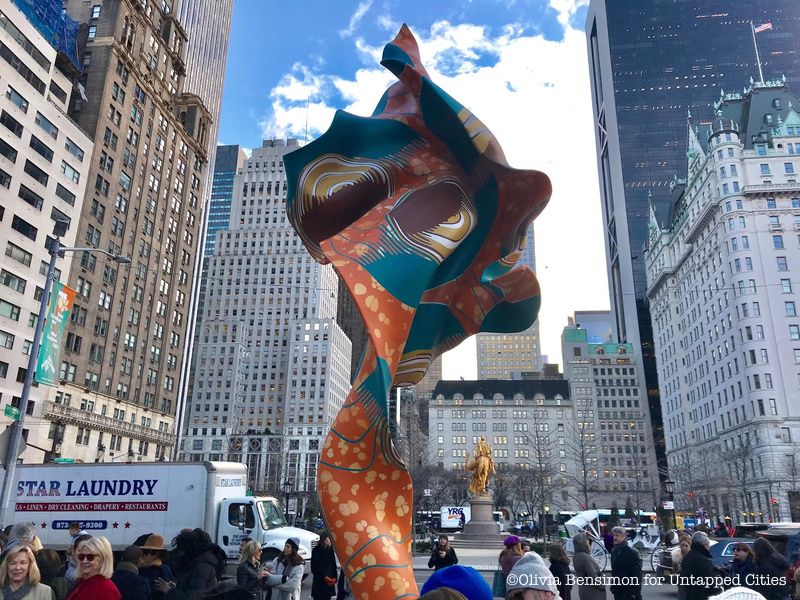
Earlier this year, British-Nigerian artist Yinka Shonibare MBE RA debuted Wind Sculpture (SG) I, a part of his Wind Sculpture series, in the Doris C. Freedman Plaza, which marks the southeast entrance to Central Park.
Shonibare, one of the best-know contemporary artists in Britain, refers to himself as a “cultural hybrid”, resulting from his ties to both Nigeria and England overlaid with the web of global relations that have stemmed from politics and trade that have shaped his upbringing and his art. In Wind Sculpture (SG) I, Shonibare took the visual of a piece of fabric blowing in the wind and rendered it into a piece of solid fiberglass. The monumental sculpture features a hand-painted pattern inspired by Dutch wax batik print fabric in order to evoke what Shonibare himself refers to as “multilayered identities.”
The exhibit will run until October 14, 2018.
“If You Lived Here” by artists Anthea Benhm and Avi Alpert is a billboard that mimics the real estate advertising slogan, “If you lived here, you’d be home by now.” In Benhm and Alpert’s work, viewers are inspired to pause and reflect on what it means to be “home” in a city of massive and ongoing gentrification and displacement. The piece aims to pierce through the cruel irrationality of the market to provoke new, more moral bases for housing. Her work prompts the questions, how can we, collectively, act to make sure that our own well-being is not caused by another’s suffering? What justice is due to those who have been forced from their homes or who can’t afford a home?
The billboard can be seen at Spring Street and Hudson Street. This project is accompanied by a digital pamphlet with more information on the project and how to get involved in fighting gentrification. Benhm has also produced a series of fake Craigslist ads which covertly guide readers to websites with information on housing justice.
Subscribe to our newsletter